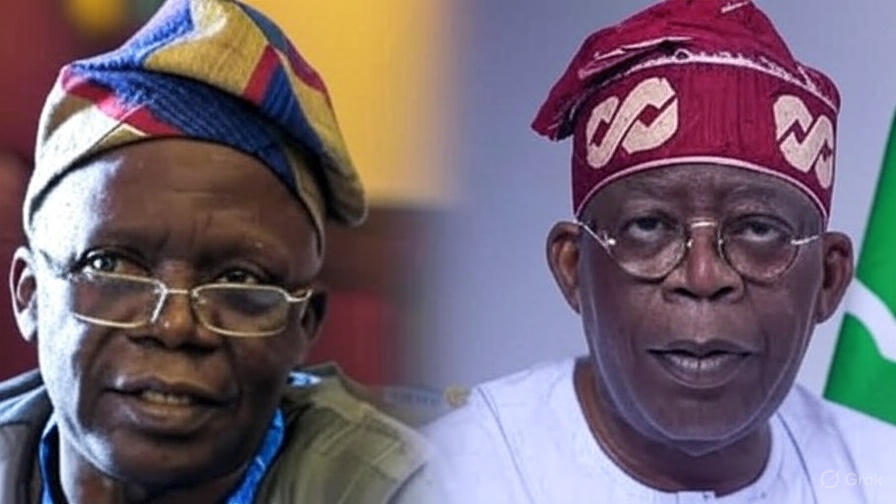
Daniel Otera
President Bola Tinubu may have urged governors to “wet the grass” at the grassroots, but for Femi Falana, the real watering should begin from the top.
The Senior Advocate of Nigeria says poverty cannot be tackled with prayers or political slogans. What’s needed, he argues, is real money, real policy, and real accountability starting with the Federal Government.
“Instead of begging state governments to ‘wet ground more’, President Bola Tinubu is urged to ensure that the National Social Investment Programme Agency Act is adopted and enacted into law by the 36 state governments,” Falana said in a statement on Sunday.
A close look at Nigeria’s 2025 federal budget exposes a troubling contrast. Only ₦32.7 billion was allocated to the National Social Investment Programme (NSIP), which is meant to support millions of poor Nigerians. Meanwhile, the Federal Government reportedly spent ₦39 billion renovating the International Conference Centre in Abuja recently renamed after President Tinubu.
The figures were published in a June 2025 analysis by Channels Television, which noted that more money was committed to the renovation of a government building than to a flagship social welfare programme expected to reach over 133 million Nigerians living in multidimensional poverty.
For Falana, the disparity is indefensible.
“A government that claims to have spent ₦39 billion on a building cannot justify allocating just ₦32.7 billion to fight poverty,” he said.
The NSIP covers conditional cash transfers, food support, and training programmes for low-income households. Critics argue that its limited funding reflects a broader lack of political will to tackle poverty at scale.
“How do you justify spending more to renovate a hall than to support 133 million Nigerians living in multidimensional poverty?” Falana asked.
According to the National Bureau of Statistics (NBS), 63 percent of Nigerians around 133 million people are classified as multidimensionally poor. This means they lack access to basic necessities such as education, healthcare, employment, and decent living standards. The data was drawn from the 2022 Multidimensional Poverty Index compiled by the NBS in collaboration with the UNDP and UNICEF.
Despite the growing hardship, federal lawmakers continue to receive hefty allowances. In 2024, Senator Abdurrahman Kawu Sumaila disclosed that each senator receives approximately ₦21 million monthly. Members of the House of Representatives reportedly earn around ₦15 million, excluding official salaries which remain below ₦1 million.
This amounts to over ₦15 billion annually paid to Nigeria’s 469 federal lawmakers at a time when citizens are demanding cost-cutting reforms and more investment in social services.
Yet, Nigeria is not broke. The Federation Accounts Allocation Committee (FAAC), using data audited by NEITI, reported that ₦11.19 trillion was shared among federal, state, and local governments between July 2023 and July 2024.
Critics say this proves the problem isn’t a lack of money. It’s how the money is being spent.
“Resources are not Nigeria’s problem,” Falana insisted. “It’s about where and how we choose to spend.”
His remarks come amid fresh controversy triggered by BudgIT, a civic tech organisation. In a July 2025 report published on its official website, BudgIT alleged that the National Assembly inserted over 11,000 questionable projects worth ₦6.93 trillion into the 2025 federal budget.
“Such a high volume of opaque and poorly defined projects significantly undermines the integrity of the budget,” BudgIT said.
Falana sees it as further proof of systemic failure.
“This kind of budget padding tells us everything about who the system is designed to serve,” he said.
To change direction, Falana is calling on the Federal Executive Council to approve at least ₦5 trillion specifically for the NSIP and to ensure the funds are co-managed by civil society and trade unions, not just government officials.
“The management of the fund should not be left solely in the hands of government officials,” he said. “It should involve elected representatives of trade unions and credible civil society organisations to ensure transparency and effectiveness.”
Many Nigerians say they’ve yet to feel the impact of government interventions. Soaring inflation continues to wipe out their incomes and savings. According to the NBS, food prices surged by 21.97 percent year-on-year as of June 2025. Month-on-month, food inflation rose by 3.25 percent up from 2.19 percent in May.
“The market no dey smile again,” said Grace Onuoha, a food trader in Jos. “Last year I bought a bag of rice for ₦48,000. Now na ₦68,000 and customers complain every day.”
The hardship is even worse in rural areas. In a report by The Washington Post, residents of Ngwoma village in the Niger Delta described how the 2023 fuel subsidy removal pushed them deeper into poverty. Transport fares have doubled, making it harder to access clinics, schools, and markets.
Even in urban centres, rising petrol prices and high inflation have placed basic goods out of reach for many families.
